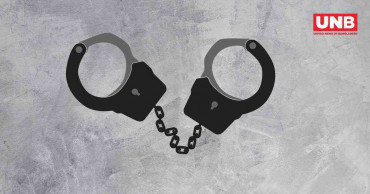terrorist
Israel must stop killing babies and women in Gaza: Macron tells BBC
Israel has to stop killing children and women in Gaza, French President Emmanuel Macron has told the BBC.During an exclusive interview, Macron said that there was "no justification" for the attack, adding that Israel would gain from a ceasefire.
While acknowledging Israel's right to self-defense, he said, "We do urge them to stop this bombing" in Gaza.However, he also emphasised that France "clearly condemns" Hamas' "terrorist" activities, the report said.
Thousands who were sheltering at Gaza City’s hospitals flee as Israel-Hamas war closes inLike Israel, the United States, the United Kingdom, and other Western countries, France views Hamas as a terrorist group.When asked about whether he wanted other world leaders to support his demands for a ceasefire, including those in the US and the UK, Macron said, "I hope they will."
Civilians flee north Gaza or shelter at a hospital as Israel and Hamas battle in the cityFollowing almost two weeks of main ground incursion into the territory and a month of Israeli shelling, the health ministry headed by Hamas in Gaza said on Friday that 11,078 Palestinians had died and 1.5 million had left their homes.Israel claimed that it followed international law when attacking military targets and that it takes precautions to lessen the number of civilian deaths by alerting civilians in advance and urging them to flee.Speaking a day after a conference in Paris on humanitarian aid related to the Gaza conflict, Macron stated that all participating governments and agencies had reached the "clear conclusion" that there is “no other solution than first a humanitarian pause, going to a ceasefire, which will allow [us] to protect... all civilians having nothing to do with terrorists.""De facto — today, civilians are bombed — de facto. These babies, these ladies, these old people are bombed and killed. So there is no reason for that and no legitimacy. So we do urge Israel to stop," the French president said.Macron, however, stated it was not for him to determine whether or not international law had been breached.
Fights in bread lines, despair in shelters: War threatens to unravel Gaza's close-knit society
2 years ago
RAB arrests 3 including Jama'atul Ansar Fil Hindal Sharqiya Ameer from Munshiganj
Rapid Action Battalion (RAB) say they have arrested three members of the militant group, Jama'atul Ansar Fil Hindal Sharqiya, including its Ameer, Md Anisur Rahman, from Munshiganj's Louhajang upazila early today (July 24, 2023).
The identities of the other operatives were not disclosed by the law enforcers.
Read: 2 arrested for detonating homemade explosive on Dhanmondi 32
Acting on a tip-off, a RAB team conducted a drive in Boronopara village in Louhajang upazila around 3 am and arrested the three men, ANM Imran Khan, assistant director of RAB's Legal and Media wing, said.
During the drive, the RAB team also recovered firearms and explosives from the alleged Jama'atul Ansar Fil Hindal Sharqiya operatives, he added.
Read: Land dealer Ekhlas killing: DB arrests 5 suspects including industrialist mastermind
Details are set to be disclosed at a media briefing at RAB's media centre in Dhaka at 11:30 am.
2 years ago
Ukraine brands Russia ‘terrorist state’ to open hearings in case against Russia at top UN court
A top Ukrainian diplomat called Russia a "terrorist state" Tuesday as he opened his country's case against Moscow at the United Nations' highest court and accused Russia of blowing up a major dam in southern Ukraine.
Anton Korynevych was addressing judges at the International Court of Justice in a case brought by Kyiv against Russia linked to Moscow's 2014 annexation of Crimea and arming of rebels in eastern Ukraine in the years before Russia's full-scale invasion in February 2022.
Ukraine wants the world court to order Moscow to pay reparations for attacks in the regions, including for the downing of Malaysia Airlines flight MH17 that was shot down by Russia-backed rebels on July 17, 2014, killing all 298 passengers and crew.
ALso Read: Ukraine accuses Russia of destroying major dam near Kherson, warns of ecological disaster
Korynevych said that with Moscow unable to beat Ukraine on the battlefield, "it targets civilian infrastructure to try to freeze us into submission. Earlier today, just today, … Russia blew up a major dam located in Nova Kakhovka, causing significant civilians evacuations, harsh ecological damages and threatening the safety of the Zaporizhzhia nuclear power plant. Russia's actions are the actions of a terrorist state, an aggressor."
Four days of hearings in the court's ornate, wood-paneled Great Hall of Justice are opening against a backdrop of Europe's deadliest conflict since World War II. Ukraine and Russia are trading accusations of blame for the damage to the Kakhovka dam and hydroelectric power station, which are located in a part of Ukraine that Moscow controls.
Meanwhile, in The Hague, lawyers for Kyiv were presenting legal arguments to support their case Tuesday, followed by Russia on Thursday. Each side has another opportunity next week to present evidence. Judges are expected to take months to issue a judgment.
"The Russian Federation has contempt for international law," Korynevych said. "Over the last 16 months, the world has woken up to this dark reality."
The case is one of several legal proceedings against Russia linked to Ukraine.
Also Read: Russia launched 'largest drone attack' on Ukrainian capital before Kyiv Day; 1 killed
In a separate case brought by Ukraine in the immediate aftermath of Russia's illegal invasion, the world court issued a preliminary order calling on Russia to stop hostilities — a legally binding ruling that Moscow ignored.
In that case, Kyiv is arguing that Russia violated the 1948 Genocide Convention by falsely accusing Ukraine of committing genocide and using that as a pretext for the Feb. 24, 2022, invasion. Moscow argues that the court does not have jurisdiction.
A few kilometers (miles) away at the International Criminal Court, judges have issued an arrest warrant for Russian President Vladimir Putin on charges of deporting and illegally transferring children from Ukraine. Russia is not a member of the court and does not recognize its jurisdiction.
Meanwhile, a Dutch domestic court last year convicted two Russians and a pro-Moscow Ukrainian for their roles in downing MH17 and sentenced them in their absence to life imprisonment. Ukraine also has another case against Russia at the International Court of Justice over its invasion last year, and the Netherlands and Ukraine are suing Moscow at the European Court of Human Rights over MH17.
Also Read: Russia says drones damage Moscow buildings in pre-dawn attack, blames Ukraine
Russia has always denied involvement in the downing of the passenger jet that was flying from Amsterdam to Kuala Lumpur when it was shot down by a Soviet-era missile over eastern Ukraine.
Tuesday's hearing is in a case Kyiv brought in 2017 related to Russia arming rebels in eastern Ukraine and restricting the rights of ethnic Tatars and other minorities following its annexation of Crimea in 2014.
In a preliminary ruling, the court ordered Russia to stop limiting "the ability of the Crimean Tatar community to conserve its representative institutions."
2 years ago
Saudi Arabia’s Etidal finds 6mn extremist content on Telegram between Jan and Mar 2023
The Saudi Global Center for Combating Extremist Ideology (Etidal) found 6,004,218 extremist content on the social media platform Telegram between January 1 and March 30 this year.
Furthermore, the two platforms have assisted in the closure of 1,840 channels that disseminate and promote extremist ideology and are affiliated with three terrorist groups (ISIS [Daesh], Al-Qaeda and Hayat Tahrir Al-Sham), reports Saudi Gazette.
Read More: Never flagged as a danger, Nice attacker traveled unimpeded
The Etidal team identified and monitored the three terrorist organizations' activity on Telegram in Arabic, it said.
It discovered 2,773,902 pieces with extremist content on 477 Hayat Tahrir al-Sham channels, 1,807,215 such pieces on 1,040 Daesh channels, and 1,423,101 pieces on 323 Al-Qaeda channels.
The Etidal monitoring team observed a peak in broadcasting activity on Telegram on January 9 this year, with 451,911 pieces of content shared and referenced to, and a peak in account creation on March 27, with over 101 channels launched in a single day, the report also said.
Read More: Shamima Begum who joined ISIS as a teen loses UK citizenship appeal
The cooperation between Etidal and Telegram continues for the second year in a row, increasing the total number of items deleted from February 2022 until now to 21,026,169; these included extremist content and 8,664 terminated terrorist channels.
2 years ago
UN names Pakistani linked to Mumbai attacks as terrorist
The United Nations has designated an anti-India militant being held in Pakistan as a global terrorist, the world body’s second such designation stemming from the 2008 terrorist attacks in Mumbai that killed 166 people.
The announcement regarding Pakistani citizen Abdul Rehan Makki was hailed by neighboring India on Tuesday, a day after the decision.
Pakistan's Foreign Ministry said the Islamic nation is itself a victim of terrorism and Pakistan supports counter-terrorism efforts at the international level, including at the United Nations.
Makki, 68, is a senior figure in the outlawed Lashkar-e-Taiba group, which is mainly active in the disputed Himalayan region of Kashmir. He was arrested in Pakistan's Punjab province in 2019 and convicted in November and December 2020 in two separate cases on charges of terror financing.
Makki was sentenced to one year in prison but officials say he is still in custody without providing an explanation. He is being held in Punjab pending his appeals, according to several government officials who are familiar with the case.
The U.N. Security Council committee overseeing sanctions against al-Qaida and Islamic State extremists and their associates put Makki on the sanctions blacklist after approval by the council’s 15 members.
Under the U.N. measure, Makki's assets can be frozen and he will also face a travel ban.
Makki is a close relative of Hafiz Saeed, a militant leader accused of orchestrating the Mumbai attacks. Saeed, 72, is serving a 31-year prison sentence and was designated a terrorist by the United States and the U.N. Security Council after the 2008 Mumbai attacks.
Saeed, like Makki, was never charged in connection with the Mumbai attacks that strained relations between Pakistan and India. He is the founder of Lashkar-e-Taiba, which was blamed by India for the attacks in India.
Read more: Savage Truth Behind Mumbai Carnage
Monday's U.N. Security Council decision came after China lifted a hold on adding Makki, who has been under U.S. sanctions since November 2010.
The spokesperson at India's Ministry of External Affairs in the capital New Delhi, Shri Arindam Bagchi, on Tuesday welcomed Makki's designation as a terrorist.
“India remains committed to pursuing a zero-tolerance approach to terrorism and will continue to press the international community to take credible, verifiable and irreversible action against terrorism," he said.
Mumtaz Zahra Baloch, the spokesperson at Pakistan's Foreign Ministry, said: “Pakistan is a victim of terrorism and supports counter-terrorism efforts at the international level including at the United Nations and other multilateral fora."
Baloch said in a statement that “Pakistan has always called for strict compliance with the Security Council’s listing rules, procedures and established processes to maintain the integrity of the UN counter-terrorism regime."
Since gaining independence from Britain in 1947, Pakistan and India, which have a history of bitter relations, have fought two of their three wars over Kashmir, which is split between them and claimed by both in its entirety.
Read more: 13th anniversary of Mumbai terror attacks observed in Bangladesh
3 years ago
6th anniversary of Gulshan cafe attack: Bangladesh's night of infamy
Today is the 6th anniversary of the Holey Artisan Bakery attack, the deadliest night of terror in the country's history that saw 22 civilians killed, the majority of them foreigners residing in or visiting the capital's diplomatic quarter around Gulshan-Baridhara.
Commemorations among relatives and those close to the victims will span the globe from Japan at one end to Italy at the other. Indeed, these are the two countries that suffered the most casualties.
Five heavily-armed young men who did not fit the profile of your typical "jihadist" executed the audacious attack that drew inspiration from ISIS.
However, investigators never uncovered any evidence of direct operational training or support from ISIS headquarters.
The unlikely militants, all in their late teens or early 20s, were not madrasa students from the hinterland. They were city boys who grew up among Bangladesh's elite, having attended top private schools and universities in Bangladesh and abroad. Their pathways to radicalisation were not foreseen, are still not very well-understood, but would seem to have been abrupt and even rapid.
On the evening of July 1, a little after 9pm, they made their move and laid siege to the upmarket cafe popular with expatriates – a calculated choice that paid off with maximum foreign casualties. Initially, they took everyone inside the cafe hostage before executing them based on nationality or religion. Some Bangladeshis were allowed to leave – one bravely refused to leave without his two foreign friends and died with them.
The victims included nine Italians, seven Japanese, one Indian, one Bangladesh-born American and two Bangladeshis.
Besides, two police officers called to the scene were also killed by grenades during the first wave of the attack – this demonstrated how well-armed they were, and law enforcers subsequently backed off to wait for specialist commandos to come in and do the job, causing a nightlong standoff.
Thirteen people, including three foreigners, were rescued while 20 bodies of the hostages were recovered from the restaurant after a successful operation led by the 1st Para-commando Battalion, an elite force in the Bangladesh Army, the following morning (July 2).
Five militants and one restaurant staff were killed and one suspected militant was arrested during the drive.
Including the militants and two policemen, the total death toll was 29 from what is definitively described as "Bangladesh's 9/11," after the 2001 attack that brought down the World Trade Centre's Twin Towers in New York, the most infamous terrorist attack of all time.
A case was filed with Gulshan Police Station in connection with what still stands as the deadliest terror attack ever in the country.
Later, the case was transferred to the Detective Branch of Dhaka Metropolitan Police.
Twenty-one people were identified behind the attack. Among them, 13 people were killed in gunfights at different times.
Police pressed charges against eight people in the case on July 23, 2018. The tribunal framed charges against them on November 26. On December 3, in the same year, the trial began with the deposition of witnesses.
On November 17, 2019, the tribunal set November 27 for delivering its verdict.
On November 27, seven men were sentenced to death for their roles in the Holey Artisan attack.
3 years ago
Suspected terrorist hacked dead in Narail
A 40-year-old suspected terrorist was hacked to death allegedly by some miscreants at Lohagara upazila in Narail early Friday.
The deceased was identified as Sohel Khan, of the upazila. There are 13 cases including four murder and arms cases against him, said Police.
Also read: 2 Jubo league activists hacked dead in Jhenaidah over toll collection, 3 held
Sheikh Abu Hena Milon, officer-in-charge (OC) of Lohagara police station, said five to seven miscreants attacked Sohel at his home in Purbodigholia village around 12am and hacked him indiscriminately, leaving him dead on the spot. At that time, his wife Razia Sultana got injured while trying to save him.
Sohel was involved in various terrorist activities in the area, said the OC.
The body was sent to Narail Sadar Hospital morgue for an autopsy, he added.
Also read:Rohingya boatman hacked to death in Cox's Bazar
Legal processes are underway to nab the killers, said the OC.
3 years ago
‘Top terrorist’ with his associate held in city
Members of Rapid Action Battalions (Rab) have arrested a top terrorist with his associate from the city’s Paltan area.
The arrestees were identified as Md Mehedi Alam, 42, of Gopalganj and his associate Md Juboraj Khan, 32, of Tangail district.
Read: 54 arrested in DMP’s anti-narcotics drives
According to a media release a team of Rab-3, receiving specific allegations, made the arrest after conducting a drive in the city’s Paltan area early Friday.
During the drive, Rab seized a foreign pistol, a magazine, 2 rounds of ammunition, 300 yaba pills and a number of weapons from their possession, said the release.
4 years ago
Authorities call fatal stabbing of UK lawmaker terrorist act
A long-serving member of Parliament was stabbed to death Friday during a meeting with constituents at a church in England, in what police said was a terrorist incident. A 25-year-old man was arrested in connection with the attack, which united Britain’s fractious politicians in shock and sorrow.
Counterterrorism officers were leading the investigation into the slaying of Conservative lawmaker David Amess. In a statement early Saturday, the Metropolitan Police described the attack as terrorism and said the early investigation “has revealed a potential motivation linked to Islamist extremism.”
Amess, 69, was attacked around midday Friday at a Methodist church in Leigh-on-Sea, a town about 40 miles (62 kilometers) east of London. Paramedics tried without success to save him. Police arrested the suspect and recovered a knife.
Also read: UK lawmaker stabbed in eastern England has died
They did not identify the suspect, who was held on suspicion of murder. Police said they believed the suspect acted alone, and were not seeking anyone else in connection with the killing, though investigations continue.
The slaying came five years after another MP, Jo Cox, was murdered by a far-right extremist in her small-town constituency, and it renewed concern about the risks politicians run as they go about their work representing voters. British politicians generally are not given police protection when they meet with their constituents.
Read: Shooting in Russian university leaves 8 dead
Tributes poured in for Amess from across the political spectrum, as well as from the community he had served for decades. Residents paid tribute to him at a vigil at a church in Leigh-on-Sea.
“He carried that great East London spirit of having no fear and being able to talk to people and the level they’re at,” the Rev. Jeffrey Woolnaugh said at the vigil, attended by about 80 people. “Not all politicians, I would say, are good at that.”
Conservative Prime Minister Boris Johnson said he and his Cabinet were “deeply shocked and heart-stricken.”
“David was a man who believed passionately in this country and in its future, and we’ve lost today a fine public servant and a much-loved friend and colleague,” Johnson said.
The prime minister would not say whether the attack meant politicians needed tighter security, saying, “We must really leave the police to get on with their investigation.”
Amess had been a member of Parliament for Southend West, which includes Leigh-on-Sea, since 1997, and had been a lawmaker since 1983, making him one of the longest-serving politicians in the House of Commons.
A social conservative on the right of his party, he was a well-liked figure with a reputation for working hard for his constituents and campaigning ceaselessly to have Southend declared a city.
Amess, who leaves a wife and five children, was knighted by Queen Elizabeth II in 2015 for his service, becoming Sir David.
Flags at Parliament were lowered to half-staff amid a profusion of questions about lawmakers’ security.
“This is an incident that will send shockwaves across the parliamentary community and the whole country,” House of Commons Speaker Lindsay Hoyle said. “In the coming days we will need to discuss and examine MPs’ security and any measures to be taken, but for now, our thoughts and prayers are with David’s family, friends and colleagues.”
Violence against British politicians is rare, but concerns have grown about the increasingly bitter polarization of the country’s politics.
In 2016, a week before the country’s divisive Brexit referendum, Cox, a Labour Party lawmaker, was fatally stabbed and shot in northern England. Also, several people have been jailed in recent years for threatening lawmakers.
British lawmakers are protected by armed police when they are inside Parliament, and security there was tightened after an attacker inspired by the Islamic State group fatally stabbed a police officer at the gates in 2017.
But politicians have no such protection in their constituencies. Amess published the times and locations of his open meetings with constituents on his website.
Two other British lawmakers have been attacked over the past two decades during their “surgeries,” regular meetings where constituents can present concerns and complaints.
Labour legislator Stephen Timms was stabbed in the stomach in 2010 by a student radicalized by online sermons from an al-Qaida-linked preacher.
In 2000, Liberal Democrat Nigel Jones and his aide Andrew Pennington were attacked by a man wielding a sword during such a meeting. Pennington was killed and Jones wounded in the attack in Cheltenham, England.
Former Prime Minister Theresa May, a Conservative, tweeted that Amess’ killing was a “tragic day for our democracy,” and former Labour Prime Minister Tony Blair said he was “shocked and horrified.”
Scottish First Minister Nicola Sturgeon of the Scottish National Party said on Twitter: “In a democracy, politicians must be accessible and open to scrutiny, but no one deserves to have their life taken while working for and representing their constituents.”
Kim Leadbeater, Jo Cox’s sister and now a member of Parliament herself, said it was “horrific” that Amess’ family was experiencing what hers had gone through.
“They will think about this every single day for the rest of their lives,” she said.
“I find myself now working as a politician and trying to do good things for people, and it’s really important you get good people in public life, but this is the risk we are all taking, and so many MPs will be scared by this.”
4 years ago
How social platforms are dealing with the Taliban
As the Taliban negotiates with senior politicians and government leaders following its lighting-fast takeover of Afghanistan, U.S. social media companies are reckoning with how to deal with a violent extremist group that is poised to rule a country of 40 million people.
Should the Taliban be allowed on social platforms if they don’t break any rules, such as a ban on inciting violence, but instead use it to spread a narrative that they’re newly reformed and are handing out soap and medication in the streets? If the Taliban runs Afghanistan, should they also run the country’s official government accounts?
And should tech companies in Silicon Valley decide what is — and isn’t — a legitimate government? They certainly don’t want to. But as the situation unfolds, uncomfortable decisions lie ahead.
Also read: Who are the Taliban?
DOES THE TALIBAN USE SOCIAL MEDIA?
The Taliban quickly seized power in Afghanistan two weeks before the U.S. was set to complete its troop withdrawal after a two-decade war. The insurgents stormed across the country, capturing all major cities in a matter of days, as Afghan security forces trained and equipped by the U.S. and its allies melted away.
The last time the Taliban was in power in Afghanistan, Facebook, Twitter and YouTube did not exist. Neither did MySpace, for that matter. Internet use in the country was virtually nonexistent with just 0.01% of the population online, according to the World Bank.
In recent years, that number has vastly increased. The Taliban have also increased their online presence, producing slick videos and maintaining official social media accounts. Despite bans, they have found ways to evade restrictions on YouTube, Facebook and WhatsApp. Last year, for instance, they used WhatsApp groups to share pictures of local health officials in white gowns and masks handing out protective masks and bars of soap to locals.
On Twitter, Taliban spokesman Zabihullah Mujahid has been posting regular updates to more than 300,000 followers, including international media. Twitter suspended another account, @AfghPresident, which has served as the nation’s de facto official presidential account, pending verification of the account holder’s identity.
“There’s a realization that winning the war is as much a function of a nonmilitary tool like social media as it is about the bullets,” said Sarah Kreps, a law professor at Cornell University who focuses on international politics, technology and national security. “Maybe these groups, even from just an instrumental perspective, have realized that beheading people is not a way to win the hearts and minds of the country.”
Also read: Taliban promise women's rights, security under Islamic rule
WAIT, THE TALIBAN WERE ALLOWED ON TWITTER?
Facebook and YouTube consider the Taliban a terrorist organization and prohibit it from operating accounts. Twitter has not explicitly banned the group, though the company said Tuesday that it will continue to enforce its rules, in particular policies than bar “glorification of violence, platform manipulation and spam.”
This essentially means that until the accounts violate Twitter’s rules — for instance, by inciting violence — they are allowed to operate.
While the Taliban is not on the U.S. list of foreign terrorist organizations, the U.S. has imposed sanctions on it. Facebook said Tuesday that the group is banned from its platform under its “dangerous organization” policies. which also bars “praise, support and representation” of the group and accounts run on its behalf. The company emphasized in a statement that it has a dedicated team of Afghanistan experts that are native speakers of Dari and Pashto, Afghanistan’s official languages, to help provide local context and to alert the company of emerging issues.
Facebook has a spotty record when it comes to enforcing its rules. Doing so on WhatsApp, also owned by Facebook, could prove more difficult given that the service encrypts messages so that no one but senders and recipients can read them.
Twitter said it is seeing people in Afghanistan using its platform to seek help and that its top priority is “keeping people safe.” Critics immediately questioned why the company continues to ban former President Donald Trump even as it allows Mujahid to post.
“They certainly decided to silence a former U.S. president,” said Alex Triantafilou, chairman of the Hamilton County Republican Party in Cincinnati, Ohio, who called Twitter’s decision “preposterous.”
Twitter permanently suspended Trump following the deadly insurrection at the U.S. Capitol on Jan. 6, saying his posts glorified and could lead to more violence. The company has long insisted that it suspends accounts based on behavior and whether they violate its rules on the service, and not on offline actions and affiliation.
While he understands that social media companies operate in a global economy, Triantafilou said, “it seems to me that supporting America and our own interest” would make more sense for a U.S. company.
Also read: What Taliban's return means for Bangladesh
WHAT HAPPENS NOW?
As the situation unfolds, the major companies are grappling with how to respond. It’s not an entirely unique situation — they have had to deal with groups such as Hamas and Hezbollah, for instance, which hold considerable political power but are also violent and have carried out acts of terrorism.
“For the past decade, Hamas has used social media to gain attention, and convey their messages to international audiences in multiple languages,” wrote Devorah Margolin, senior research fellow at the Program on Extremism at The George Washington University, in a July report. For example, she wrote, both the political and military wings of Hamas operated official accounts on Twitter.
Despite attempts to use its English-language account to make its case to the international community, Margolin said the group still used Twitter to call for violence. In 2019, Twitter closed the official accounts, @HamasInfo and @HamasInfoEn, for violating its rules, saying there is “no place on Twitter for illegal terrorist organizations and violent extremist groups.”
Facebook declined to say specifically if it would hand over Afghanistan’s official government accounts to the Taliban if it is recognized as the country’s government. The company pointed to an earlier statement saying it “does not make decisions about the recognized government in any particular country but instead respects the authority of the international community in making these determinations.”
Twitter declined to answer questions beyond its statement. YouTube, meanwhile, provided a boilerplate statement saying it complies with “all applicable sanctions and trade compliance laws” and bans the incitement of violence.
All that effectively leaves the door open for the social platforms to eventually hand over control of the official accounts, assuming the Taliban behave and U.S. sanctions are lifted. “That seems like a reasonable approach, because I think the social media platforms don’t necessarily want to be adjudicating is which groups are legitimate themselves,” said Kreps, who served in the U.S. Air Force from 1999 to 2003, partly in Afghanistan.
At the same time, she noted, the companies, especially Facebook, have learned a great deal — and paid a price — for the way the way social media helped incite genocidal behavior in Myanmar. And they’re unlikely to want a repeat of those horrors.
4 years ago








.jpg)
.jpg)





